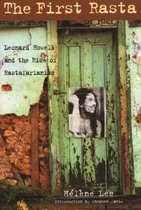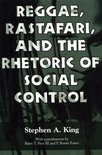Reggae, Rastafari, and the Rhetoric of Social Control
Afbeeldingen
Sla de afbeeldingen overArtikel vergelijken
Auteur:
Stephen A. King
Barry t. Bays Iii
Co-auteur:
P. Renee Foster
- Engels
- Paperback
- 9781604730036
- 30 november 2007
- 200 pagina's
Samenvatting
Drawing on research in social movement theory and protest music, Reggae, Rastafari, and the Rhetoric of Social Control traces the history and rise of reggae and the story of how an island nation commandeered the music to fashion an image and entice tourists.
Who changed Bob Marley's famous peace-and-love anthem into ""Come to Jamaica and feel all right""? When did the Rastafarian fighting white colonial power become the smiling Rastaman spreading beach towels for American tourists? Drawing on research in social movement theory and protest music, Reggae, Rastafari, and the Rhetoric of Social Control traces the history and rise of reggae and the story of how an island nation commandeered the music to fashion an image and entice tourists. Visitors to Jamaica are often unaware that reggae was a revolutionary music rooted in the suffering of Jamaica's poor. Rastafarians were once a target of police harassment and public condemnation. Now the music is a marketing tool, and the Rastafarians are no longer a ""violent counterculture"" but an important symbol of Jamaica's new cultural heritage. This book attempts to explain how the Jamaican establishment's strategies of social control influenced the evolutionary direction of both the music and the Rastafarian movement. From 1959 to 1971, Jamaica's popular music became identified with the Rastafarians, a social movement that gave voice to the country's poor black communities. In response to this challenge, the Jamaican government banned politically controversial reggae songs from the airwaves and jailed or deported Rastafarian leaders. Yet when reggae became internationally popular in the 1970s, divisions among Rastafarians grew wider, spawning a number of pseudo-Rastafarians who embraced only the external symbolism of this worldwide religion. Exploiting this opportunity, Jamaica's new Prime Minister, Michael Manley, brought Rastafarian political imagery and themes into the mainstream. Eventually, reggae and Rastafari evolved into Jamaica's chief cultural commodities and tourist attractions. Stephen A. King is associate professor of speech communication at Delta State University. His work has been published in the Howard Journal of Communications, Popular Music and Society, and The Journal of Popular Culture.
Who changed Bob Marley's famous peace-and-love anthem into ""Come to Jamaica and feel all right""? When did the Rastafarian fighting white colonial power become the smiling Rastaman spreading beach towels for American tourists? Drawing on research in social movement theory and protest music, Reggae, Rastafari, and the Rhetoric of Social Control traces the history and rise of reggae and the story of how an island nation commandeered the music to fashion an image and entice tourists. Visitors to Jamaica are often unaware that reggae was a revolutionary music rooted in the suffering of Jamaica's poor. Rastafarians were once a target of police harassment and public condemnation. Now the music is a marketing tool, and the Rastafarians are no longer a ""violent counterculture"" but an important symbol of Jamaica's new cultural heritage. This book attempts to explain how the Jamaican establishment's strategies of social control influenced the evolutionary direction of both the music and the Rastafarian movement. From 1959 to 1971, Jamaica's popular music became identified with the Rastafarians, a social movement that gave voice to the country's poor black communities. In response to this challenge, the Jamaican government banned politically controversial reggae songs from the airwaves and jailed or deported Rastafarian leaders. Yet when reggae became internationally popular in the 1970s, divisions among Rastafarians grew wider, spawning a number of pseudo-Rastafarians who embraced only the external symbolism of this worldwide religion. Exploiting this opportunity, Jamaica's new Prime Minister, Michael Manley, brought Rastafarian political imagery and themes into the mainstream. Eventually, reggae and Rastafari evolved into Jamaica's chief cultural commodities and tourist attractions. Stephen A. King is associate professor of speech communication at Delta State University. His work has been published in the Howard Journal of Communications, Popular Music and Society, and The Journal of Popular Culture.
Productspecificaties
Wij vonden geen specificaties voor jouw zoekopdracht '{SEARCH}'.
Inhoud
- Taal
- en
- Bindwijze
- Paperback
- Oorspronkelijke releasedatum
- 30 november 2007
- Aantal pagina's
- 200
- Illustraties
- Nee
Betrokkenen
- Hoofdauteur
- Stephen A. King
- Tweede Auteur
- Barry t. Bays Iii
- Co Auteur
- P. Renee Foster
- Hoofduitgeverij
- University Press Of Mississippi
Overige kenmerken
- Extra groot lettertype
- Nee
- Product breedte
- 152 mm
- Product hoogte
- 11 mm
- Product lengte
- 228 mm
- Studieboek
- Nee
- Verpakking breedte
- 152 mm
- Verpakking hoogte
- 19 mm
- Verpakking lengte
- 229 mm
- Verpakkingsgewicht
- 295 g
EAN
- EAN
- 9781604730036
Je vindt dit artikel in
- Categorieën
- Boek, ebook of luisterboek?
- Boek
- Stroming of stijl
- Reggae & Ska
- Taal
- Engels
- Beschikbaarheid
- Leverbaar
Kies gewenste uitvoering
Kies je bindwijze
Bekijk alle bindwijzen (3)
Prijsinformatie en bestellen
De prijs van dit product is 59 euro en 99 cent.
Uiterlijk 1 juni in huis
Verkoop door bol
- Prijs inclusief verzendkosten, verstuurd door bol
- Ophalen bij een bol afhaalpunt mogelijk
- 30 dagen bedenktijd en gratis retourneren
- Dag en nacht klantenservice
Alle bindwijzen en edities (3)
-
17,99Direct beschikbaar
-
31,99Direct beschikbaar
-
59,99Uiterlijk 1 juni in huis
Levertijd
We doen er alles aan om dit artikel op tijd te bezorgen. Het is echter in een enkel geval mogelijk dat door omstandigheden de bezorging vertraagd is.
Bezorgopties
We bieden verschillende opties aan voor het bezorgen of ophalen van je bestelling. Welke opties voor jouw bestelling beschikbaar zijn, zie je bij het afronden van de bestelling.
Tooltip
Rapporteer dit artikel
Je wilt melding doen van illegale inhoud over dit artikel:
- Ik wil melding doen als klant
- Ik wil melding doen als autoriteit of trusted flagger
- Ik wil melding doen als partner
- Ik wil melding doen als merkhouder
Geen klant, autoriteit, trusted flagger, merkhouder of partner? Gebruik dan onderstaande link om melding te doen.











